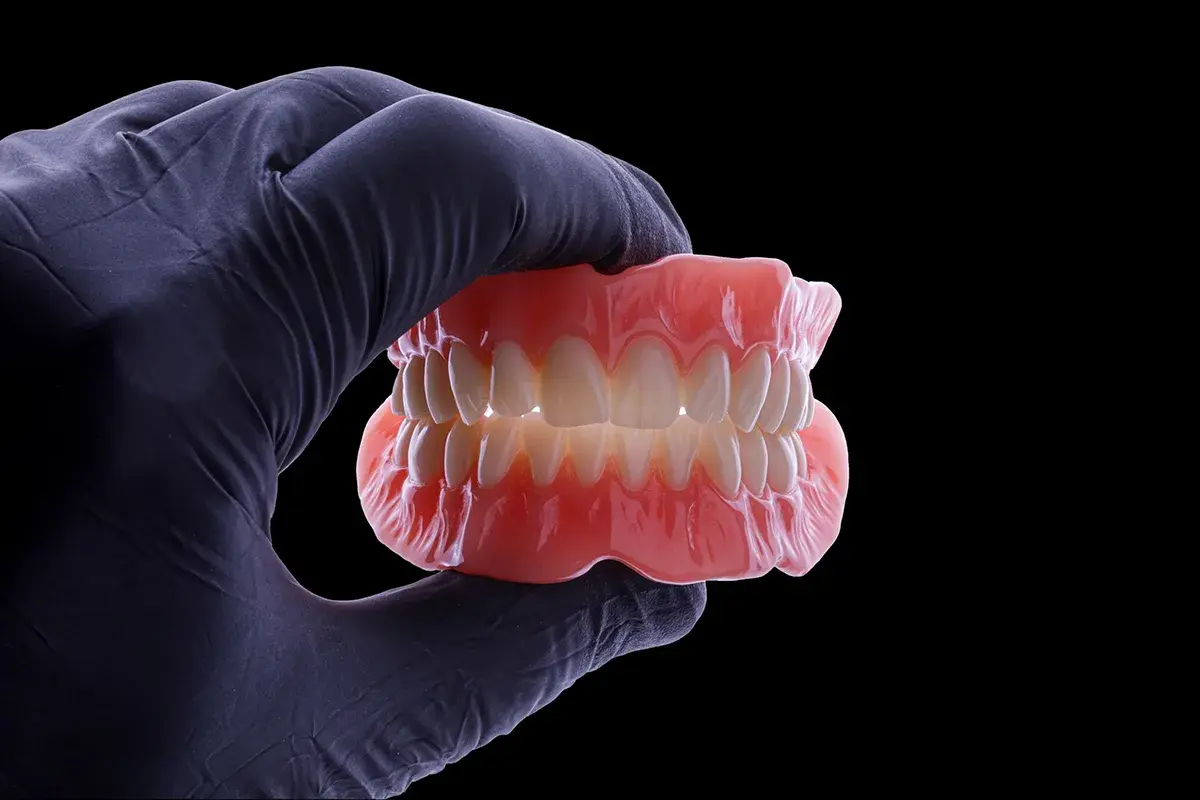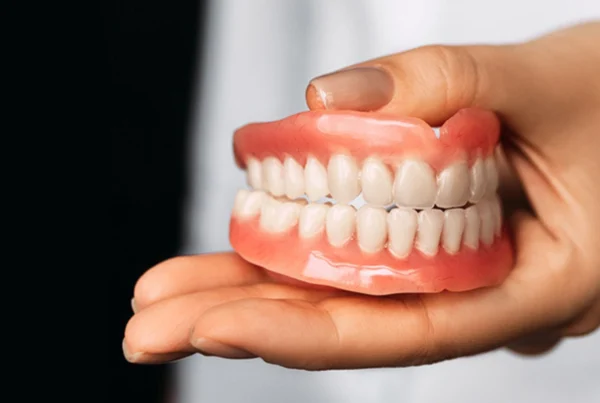Partial dentures need just as much care as your natural teeth to prevent bacteria buildup and infections. Daily cleaning with the right tools and techniques keeps your mouth healthy and your dentures lasting longer.
Using regular toothpaste or harsh cleaners can damage your dentures and create places for bacteria to hide. Gentle brushing with special denture cleaners and proper soaking are essential for good oral health.
Taking care of partial dentures isn’t rocket science, but a lot of people get it wrong. Dr. Elaine Wu at ReNEW Dental in Tewksbury, Massachusetts sees patients all the time who think their dentures don’t need much attention. With her summa cum laude DMD from Boston University and advanced training at the Kois Center, she knows that proper denture care is absolutely crucial for your health.
Too many people treat their partial dentures like they’re indestructible. They’ll use whatever’s handy to clean them or skip cleaning altogether some days. Dr. Wu’s Excellence in Implantology Award and commitment to science-based dentistry means she understands exactly what happens when dentures aren’t cared for properly.
The truth is, bacteria love to hide on dentures just as much as they do on your natural teeth. Maybe even more, because dentures have little spaces and attachments where germs can really settle in and multiply.
Understanding Why Proper Denture Care Matters
Maintaining excellent hygiene for partial dentures is absolutely essential for preventing harmful bacteria that can seriously damage your oral health. Just like your natural teeth, partial dentures harbor bacteria and plaque that can lead to infections if you don’t clean them regularly.
You need to treat your dentures exactly like you would your natural teeth, with consistent and careful daily care. This means brushing them every day to remove food particles and plaque, which prevents gum disease and bad breath that come from neglected oral hygiene.
The Real Risks of Skipping Denture Cleaning
When you don’t clean your partial dentures properly, some pretty nasty stuff can start growing. Streptococcus mutans, the bacteria that causes tooth decay, absolutely loves to multiply on dirty dentures. This can lead to infections and even damage your remaining natural teeth.
Fungal infections are another gross problem. Candida albicans can cause oral thrush, which creates white patches in your mouth, makes everything taste weird, and can make swallowing painful. If this gets really bad, it can even affect your whole body’s health.
The solution is combining mechanical cleaning (physically scrubbing off the gunk) with chemical cleaning (using special solutions to kill germs). Both methods working together give you the best protection against these nasty health problems.
Common Myths That Get People in Trouble
One of the biggest mistakes people make is thinking partial dentures need less care than natural teeth. This couldn’t be more wrong. Dentures actually need just as much attention, if not more, because bacteria can hide in all those little spaces and attachments.
Another dangerous myth is that you can clean dentures with any household cleaner. Using harsh chemicals or abrasive scrubbers can scratch the delicate surfaces, which creates perfect hiding spots for bacteria. This damage also makes your dentures look terrible and fit poorly.
Some people ignore minor discomfort, thinking it’s no big deal. A loose fit or slight irritation can be early warning signs of serious problems. Dr. Wu always tells patients that addressing small issues quickly prevents major headaches later.
How to Actually Clean Your Dentures Right
Getting the cleaning technique right is super important for keeping your dentures in good shape and bacteria-free. First, you need to use a soft-bristled brush that’s specifically made for dentures. Regular toothbrushes can be too harsh and damage the surface.
Brush your dentures daily, being gentle but thorough. Make sure you clean all surfaces and don’t bend any of the metal attachments. Take your time and be careful with this step.
- Use a soft-bristled denture brush, never a regular toothbrush
- Clean all surfaces thoroughly but gently every day
- Soak in proper denture cleaner as directed by manufacturer
- Avoid hot water or harsh chemicals that can warp the material
- Rinse well after soaking to remove any cleaner residue
Soaking is just as important as brushing. Use a non-abrasive denture cleanser that bubbles up to remove stains and kill bacteria. Follow the directions exactly because soaking too long can damage the material, but not soaking long enough leaves harmful germs behind.

ReNEW Dental’s Smart Approach to Denture Care
Dr. Wu doesn’t believe in one-size-fits-all solutions when it comes to denture care. She creates personalized care plans that consider your lifestyle, the type of dentures you have, and what materials they’re made from. This customized approach makes sure your cleaning routine actually works for your specific situation.
Education is a huge part of what she does. Dr. Wu provides comprehensive guides and clear instructions that break down exactly how to clean your dentures safely and effectively. When you understand what you’re doing and why, you’re way more likely to do it right.
Spotting Signs That Something’s Wrong
Persistent bad breath is usually the first sign that bacteria are winning the battle. If you’re still getting bad breath even after cleaning your dentures regularly, it means germs are hiding somewhere your daily cleaning isn’t reaching.
Discomfort or sore spots in your mouth often mean your dentures aren’t fitting properly anymore. This can happen when bacteria buildup changes the shape of your dentures or when poor cleaning leads to material breakdown.
Visible plaque on your dentures is a clear red flag. If you can see buildup that won’t come off with regular cleaning, it’s time to see Dr. Wu for professional help before the problem gets worse.
Getting the Support You Need
Taking care of dentures can feel overwhelming sometimes, but you don’t have to figure it all out alone. Dr. Wu encourages patients to connect with others who wear dentures because sharing experiences and tips can be really helpful.
Family members often play a big role in denture care, especially for older adults or people with mobility issues. Dr. Wu provides guidance for families on how to help their loved ones maintain proper denture hygiene at home.
Technology can help too. Reminder apps on your phone can keep you on track with your cleaning schedule, making sure you don’t skip sessions. And regular check-ups with Dr. Wu ensure your cleaning routine is working and catch any problems early.
Making Denture Care a Habit That Sticks
The key to successful denture care is making it as routine as brushing your natural teeth. Set up a regular cleaning schedule and stick to it every single day. This consistency prevents bacteria from getting established and keeps your mouth healthy.
Using the right tools makes a huge difference. Invest in proper denture brushes and recommended cleaning solutions. These specialized products are designed to clean effectively without causing damage, which saves you money and problems in the long run.
Regular visits to Dr. Wu ensure your dentures stay in great shape and your cleaning routine stays effective. She can spot issues you might miss and make adjustments to keep everything working perfectly. Her advanced training and experience mean you’re getting the best possible guidance for your denture care.
If you’re struggling with denture care or noticing signs like bad breath, discomfort, or visible buildup, don’t wait for things to get worse. Dr. Wu can evaluate your situation, adjust your cleaning routine, and make sure your dentures are serving you well. Schedule your consultation today to get personalized advice that keeps your mouth healthy and your dentures lasting as long as possible.
ReNEW Dental
978-451-1500
1201 Main St. Tewksbury, MA 01876
Schedule your consultation today!
Frequently Asked Questions
Can I clean my partial dentures with regular toothpaste?
Regular toothpaste is actually too abrasive for partial dentures and can scratch the surface, creating places for bacteria to hide. Instead, use a soft-bristled denture brush with specialized denture cleaner that’s gentle but effective at removing plaque and killing germs.
How often should I clean my partial dentures?
You should clean your partial dentures every single day, just like you would brush your natural teeth. Daily cleaning prevents plaque buildup and reduces the risk of infections, bad breath, and other oral health problems that can affect your whole body.
What should I do if my partial dentures start to feel uncomfortable?
Discomfort usually means something needs attention, whether it’s the fit, your cleaning routine, or early signs of a problem. Contact Dr. Wu as soon as possible to address the issue before it gets worse and causes more serious oral health problems.




